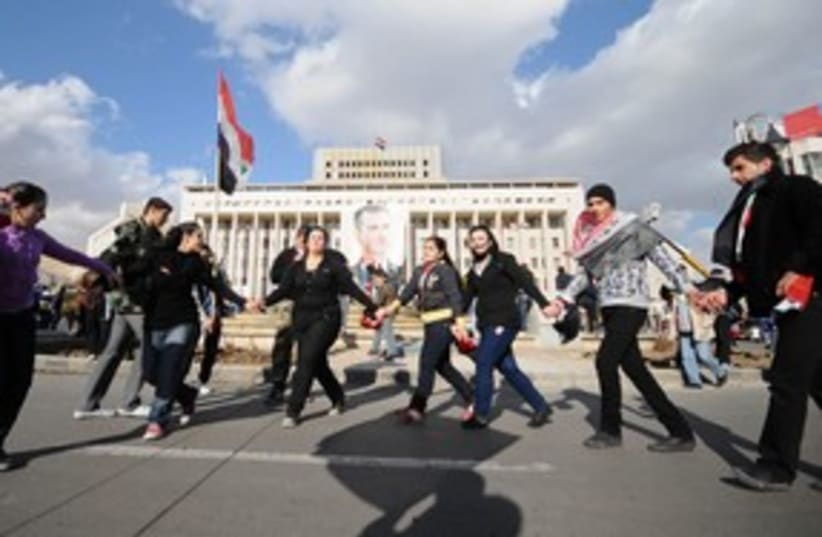RELATED:France rejects Russia's Syria resolutionDamascus immediately agreed to all of the terms except the last, which it condemned as a “violation of sovereignty.”Andrew Tabler, a Next Generation Fellow at the Washington Institute for Near East Policy, said Monday’s apparent change of heart is merely the latest empty gesture from a regime intent on clinging to power by any means.Assad “hides behind sovereignty, and this plan would seem to put his activities in the spotlight. He will now try to skirt around the plan to his advantage and play for time,” said Tabler, author of the recently released book In the Lion’s Den: An Eyewitness Account of Washington’s Battle with Syria.“If he pulls back from cities and people protest, the true scale of the uprising will be apparent. That will be hard for him to handle politically,” he said.With the Syrian uprising in its ninth month and more than 5,000 people believed killed, Assad’s diplomatic standing has all but collapsed.The US and EU have both implemented tough sanctions, and last month the Arab League took the rare step of suspending Syria, a founding member of the 21-nation Arab bloc.Damascus now has just two close friends left – Iran and Russia.The Islamic Republic uses Syria as a conduit for arms and money to Hezbollah and Hamas, and prizes the country as its only strong ally among the Arab states.Russia’s ties with Syria date back decades – throughout the three-decade presidency of Assad’s father and predecessor Hafez, Syria received a steady flow of money, weapons and advisers from the Soviet Union.Today, the two countries enjoy a mutually advantageous relationship: Russia is Syria’s largest arms supplier, while the Syrian coastal city of Tartus hosts a Russian naval base that is the Kremlin’s only overseas naval base and its gateway to the Mediterranean. Since 2009 the Russians have been quietly modernizing the base and dredging its port to allow access for the larger ships in its naval fleet.But Syria’s growing diplomatic isolation has now forced even Russia to deliver its own perfunctory condemnation of the violence. Last week it circulated a surprise draft resolution in the UN Security Council castigating Damascus for its “disproportionate use of force.”
Analysts: Assad ‘change of heart’ merely posturing
Syrian leader has rich history of undelivered promises.

RELATED:France rejects Russia's Syria resolutionDamascus immediately agreed to all of the terms except the last, which it condemned as a “violation of sovereignty.”Andrew Tabler, a Next Generation Fellow at the Washington Institute for Near East Policy, said Monday’s apparent change of heart is merely the latest empty gesture from a regime intent on clinging to power by any means.Assad “hides behind sovereignty, and this plan would seem to put his activities in the spotlight. He will now try to skirt around the plan to his advantage and play for time,” said Tabler, author of the recently released book In the Lion’s Den: An Eyewitness Account of Washington’s Battle with Syria.“If he pulls back from cities and people protest, the true scale of the uprising will be apparent. That will be hard for him to handle politically,” he said.With the Syrian uprising in its ninth month and more than 5,000 people believed killed, Assad’s diplomatic standing has all but collapsed.The US and EU have both implemented tough sanctions, and last month the Arab League took the rare step of suspending Syria, a founding member of the 21-nation Arab bloc.Damascus now has just two close friends left – Iran and Russia.The Islamic Republic uses Syria as a conduit for arms and money to Hezbollah and Hamas, and prizes the country as its only strong ally among the Arab states.Russia’s ties with Syria date back decades – throughout the three-decade presidency of Assad’s father and predecessor Hafez, Syria received a steady flow of money, weapons and advisers from the Soviet Union.Today, the two countries enjoy a mutually advantageous relationship: Russia is Syria’s largest arms supplier, while the Syrian coastal city of Tartus hosts a Russian naval base that is the Kremlin’s only overseas naval base and its gateway to the Mediterranean. Since 2009 the Russians have been quietly modernizing the base and dredging its port to allow access for the larger ships in its naval fleet.But Syria’s growing diplomatic isolation has now forced even Russia to deliver its own perfunctory condemnation of the violence. Last week it circulated a surprise draft resolution in the UN Security Council castigating Damascus for its “disproportionate use of force.”